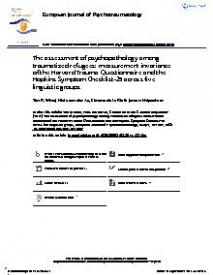The assessment of psychopathology among traumatized refugees : measurement invariance of the Harvard Trauma Questionnaire and the Hopkins Symptom Checklist-25 across five linguistic groups
Background: Questionnaires are widely used to assess the mental health status of refugees, whereas their construct validity largely remains unexplored.
Objective: This study examined the construct validity of two widely-used instruments for the assessment of PTSD symptoms (Harvard Trauma Questionnaire [HTQ]; 16 items) and symptoms of anxiety and depression (Hopkins Symptom Check list-25 [HSCL-25]; 25 items) among Dutch and refugee patients with different linguistic backgrounds.
Method: We applied exploratory factor analyses and measurement invariance analyses to test construct validity.Participants (n =1 256) were divided into five linguistic groups defined by language family, including four non-western linguistic groups (Indo-Iranian [n = 262], Niger-Congo [n = 134], Semitic [n = 288], and South Slavic languages [n = 199]) and one western linguistic group (Germanic languages; Dutch [n = 373]).
Results: Exploratory factor analysis yielded a 3-factor structure of the HTQ and a 2-factor structure of the HSCL-25. Measurement invariance 20 analyses on the HTQ showed strong measurement invariance across the groups of refugee patients. However, Dutch patients reported milder symptom severity on most items of the HTQ. Measurement invariance analyses on the HSCL-25 (not conducted in Dutch patients) indicated partial strong measurement invariance across refugee patients.
Conclusion: We conclude that mental health constructs measured by the HTQ and the HSCL25 25 are to a large extent interpreted in a similar way by refugee patients. This indicates that these instruments can be applied in non-western refugee patient populations, and that local idioms of distress and inherent response patterns may not play a major role when applying the HTQ and the HSCL-25 in these populations. Yet, whereas meaningful comparisons of observed PTSD and depression scores between groups of refugee patients with different non30 western linguistic background are feasible, comparisons between patients with a western and non-western linguistic background, as well as comparisons of anxiety scores, are likely to be biased. Future studies need to establish whether the commonly used cut-off scores of both questionnaires apply for refugee patients with non-western linguistic backgrounds.
In: European Journal of Psychotraumatology, ISSN 2000-8066 | 8 | sup2 | 1321357
http://dx.doi.org/10.1080/20008198.2017.1321357


